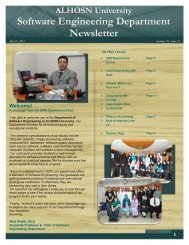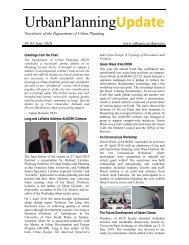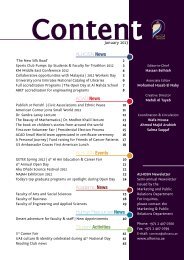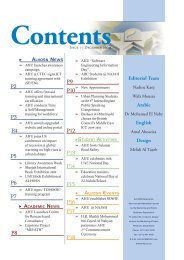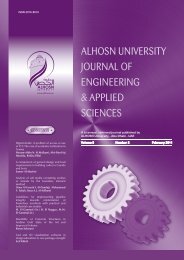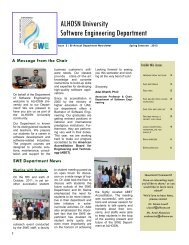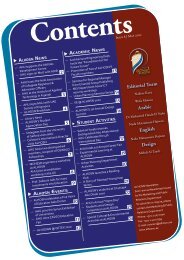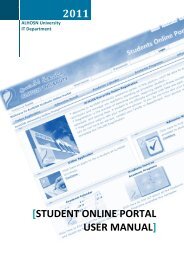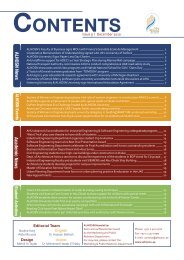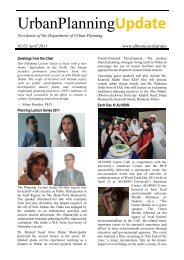ALHOSN University Catalogue Global Knowledge with Local Vision ...
ALHOSN University Catalogue Global Knowledge with Local Vision ...
ALHOSN University Catalogue Global Knowledge with Local Vision ...
Create successful ePaper yourself
Turn your PDF publications into a flip-book with our unique Google optimized e-Paper software.
PO-G: an ability to communicate effectively [ABET (g)]<br />
PO-H: the broad education necessary to understand the impact of engineering solutions in a<br />
global, economic, environmental, and societal context [ABET (h)]<br />
PO-I: a recognition of the need for, and an ability to engage in life-long learning [ABET (i)]<br />
PO-J: a knowledge of contemporary issues [ABET (j)]<br />
PO-K: an ability to use the techniques, skills, and modern engineering tools necessary for<br />
engineering practice [ABET (k)]<br />
PO-L: an ability to design, develop, implement, and improve integrated systems that include<br />
people, materials, information, equipment and energy [ABET Specific IE program criterion].<br />
Main Careers of IE’s?<br />
Industrial engineers determine the most effective ways for an organization to make a product or<br />
provide a service. They design, improve, and install systems of people, materials, information,<br />
equipment, and energy. Industrial engineers are the bridge between management goals and operational<br />
performance because they are concerned <strong>with</strong> increasing productivity through the management of<br />
people, methods of business, and technology. Industrial engineers often move into top management<br />
positions because of their management skills and holistic view of the organization. They work for just<br />
about any business or company that wants a better product or deliver a better service. Many IE’s start<br />
their companies or go into consulting. Industrial engineering is challenging, rewarding, and full of<br />
opportunities.<br />
There are many professional choices for IE’s such as:<br />
<br />
<br />
<br />
<br />
<br />
<br />
<br />
<br />
<br />
<br />
Process engineer: define proper work methods and processes and ways to measure the<br />
performance of these processes. In addition, perform continuous improvement activities to<br />
improve capacity and solve problems.<br />
Quality/Reliability engineer: verifying that products and services meet customer requirement<br />
over the useful life of the product.<br />
Operations engineer/manager: utilizing all resources efficiently and effectively <strong>with</strong> cost<br />
and performance in mind. The need for operation engineers is on the rise: starting from plants,<br />
hospitals, hotels, and educational systems.<br />
Production engineer: optimization of incoming and outgoing material including in-house<br />
inventory, managing resources, and maintaining schedules to meet required production and<br />
distribution schedules.<br />
Manufacturing engineer: work on developing and optimizing methods to manufacture products.<br />
Safety, human factor or ergonomics engineer: look for better ways to design products, tools<br />
and processes according to human capability.<br />
Project manager: manage projects by mapping out who does what, when, and how it can be<br />
done more efficiently. Form and direct teams to work toward a specific task and objectives.<br />
Supply chain engineers: manage supplier relationships, supplier cost and performance, and<br />
work <strong>with</strong> outsourcing to ensure product or service quality, delivery and cost are on target.<br />
Strategic planning engineer: develop long range planning models and identify anticipated<br />
investments, develop preliminary financial impacts including profitability and ROI.<br />
Financial engineer: determine production and service cost, forecast and develop budgets,<br />
and perform cost benefit analysis for prospective projects.<br />
Industrial Training/Internship<br />
The BSIE degree includes a mandatory training/internship component of one summer semester at the<br />
end of the third year of the program (at least 4-week duration full-time or equivalent). This training<br />
provides practical on-the-job experience to compliment the university classroom studies. The<br />
training/internship is an integral component of the degree program. This work experience helps<br />
students develop an understanding of the industry that will need them in their professional capacity in<br />
the near future. It will allow students to see the transition between the classroom and the field and<br />
creates an aptitude so they can see the big picture of the industry that they will be required to serve<br />
and lead. The industrial training/internship program has the specific objective of providing students<br />
105




